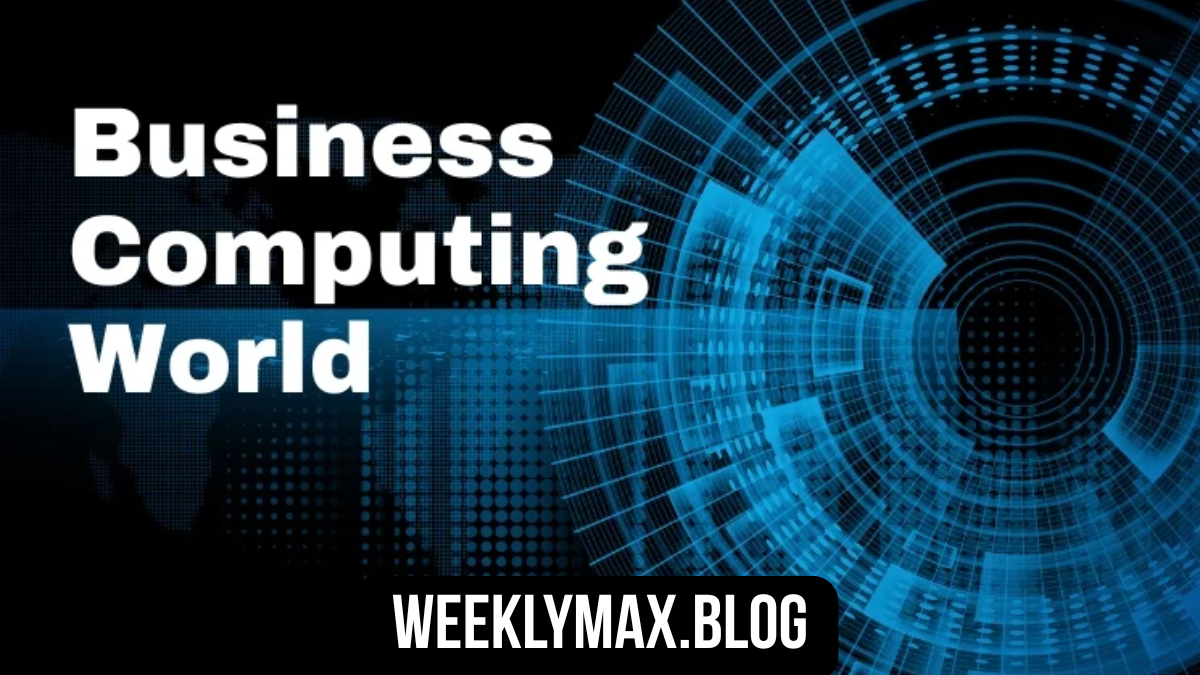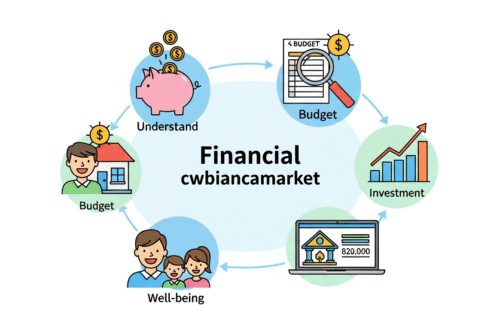What is Business Computing World?
Business Computing World rapidly evolving technological landscape, the concept of Business Computing World has become central to how organizations operate, compete, and innovate. Business computing refers to the integration of computer systems, software applications, networking solutions, and data analytics into core business operations. This integration is not just about automation; it is about creating intelligent systems that inform decision-making, enhance productivity, and provide measurable outcomes. The term “Business Computing World” describes the global ecosystem of enterprises, technology providers, and professionals who utilize computing technologies to support and transform business operations.
The Impact of Digital Transformation
One of the most significant effects of business computing is the digital transformation of enterprises. Organizations are increasingly adopting enterprise resource planning (ERP) systems, customer relationship management (CRM) platforms, and business intelligence tools to streamline operations and enhance customer engagement. These tools allow businesses to consolidate information from multiple sources, providing a comprehensive view of operations and facilitating data-driven decision-making. Automation technologies also reduce manual tasks, improve accuracy, and allocate resources to strategic initiatives, creating a more agile, responsive, and competitive business environment.
The Role of Cloud Computing
Cloud computing has become a cornerstone of the Business Computing World. Cloud platforms provide scalable infrastructure, enabling businesses to access computational resources on demand. This reduces the need for substantial upfront investment in hardware and software, allowing companies of all sizes to benefit from advanced technology. Cloud computing also facilitates collaboration across distributed teams, enabling real-time information sharing and accelerating innovation. Organizations can deploy applications quickly, experiment with new ideas, and respond to market changes with unprecedented speed.
Data Analytics and Artificial Intelligence
Data is often described as the new oil, and business computing enables organizations to harness this resource effectively. Advanced analytics tools process massive volumes of data from various sources, including customer interactions, social media, supply chain operations, and market trends. Artificial intelligence and machine learning enhance these capabilities by identifying patterns, optimizing processes, and automating complex tasks. Predictive analytics, for example, can help a company forecast demand, reduce inventory costs, and improve customer satisfaction. This data-driven approach transforms strategic decision-making and operational efficiency.
Cybersecurity in Business Computing
As organizations increasingly rely on digital systems, cybersecurity has become a critical concern. Business computing involves implementing robust security measures, including encryption, firewalls, intrusion detection systems, and access controls. Protecting data integrity, confidentiality, and availability is not just a technical challenge but a business imperative. Companies must balance accessibility and security while maintaining compliance with industry regulations and data privacy laws, ensuring that sensitive information remains protected.
Digital Collaboration and Remote Work Solutions
The Business Computing World has also revolutionized workplace dynamics. Remote work and digital collaboration tools have become essential, allowing teams to communicate, manage projects, and share information seamlessly across locations. The COVID-19 pandemic accelerated the adoption of these technologies, proving that flexible and scalable computing solutions can maintain productivity and innovation even in distributed work environments. This shift has expanded the global talent pool and enabled organizations to access expertise regardless of geographical constraints.
Emerging Technologies Shaping Business Computing
Emerging technologies are constantly reshaping the Business Computing World. Blockchain offers secure and transparent transaction mechanisms that are transforming supply chain management, finance, and contract management. The Internet of Things (IoT) enables businesses to collect real-time data from connected devices, improving operational efficiency and predictive maintenance. Virtual reality (VR) and augmented reality (AR) are increasingly used in training, product development, and customer engagement, providing immersive experiences that drive competitive differentiation. Staying up-to-date with these innovations is essential for businesses seeking to remain competitive and innovative.
Governance and Strategic Alignment
Effective governance is a crucial aspect of business computing. Organizations must establish frameworks to manage IT resources, align technology with business objectives, and ensure ethical use of digital tools. Governance involves setting strategic priorities, monitoring performance, managing risks, and fostering innovation. This ensures that technology investments deliver value, mitigate risks, and support long-term organizational goals, allowing businesses to harness technology strategically rather than reactively.
Digital Entrepreneurship and Innovation
Business computing has empowered digital entrepreneurship. Entrepreneurs leverage computing technologies to create innovative products, services, and business models. Digital platforms enable startups to scale rapidly, reach global audiences, and access advanced operational and analytical tools without heavy infrastructure investment. Industries such as e-commerce, fintech, healthtech, and edtech have flourished due to these advancements. The integration of entrepreneurship and business computing is driving a new wave of economic activity and societal change.
Workforce Development and Human Expertise
While technology is central to business computing, human expertise remains vital. Skilled professionals, including data scientists, cybersecurity analysts, cloud architects, and business analysts, are essential to designing, implementing, and managing complex systems. Organizations must invest in workforce development, continuous learning, and knowledge-sharing to harness the full potential of business computing technologies. The synergy between human insight and technological capability ensures innovation, resilience, and operational excellence.
Sustainability and Corporate Responsibility
Business computing also supports sustainability initiatives. Organizations use computing technologies to optimize resource usage, reduce waste, and monitor environmental impact. Smart grids, energy management systems, and sustainable supply chain analytics demonstrate how technology can enhance operational efficiency while promoting environmental stewardship. Aligning technology with sustainability reflects the growing awareness that business success is inseparable from social and environmental responsibility.
The Global Dimension of Business Computing
The Business Computing World operates on a global scale, influenced by diverse technological infrastructures, regulatory frameworks, and market dynamics. Organizations must navigate regional differences in standards, cultural expectations, and legal requirements. Business computing solutions facilitate localization, compliance management, and cross-border collaboration. Companies that effectively leverage these tools can expand their reach, enhance competitiveness, and respond quickly to international market opportunities.
Future Trends in Business Computing
The future of the Business Computing World is characterized by continuous innovation, automation, and intelligent systems. Organizations must embrace agility, experimentation, and a willingness to adapt to technological change. Integrating advanced computing systems into core operations allows businesses to anticipate market trends, respond to customer needs, and differentiate themselves in competitive environments. Business computing is no longer just a support function; it is a strategic enabler of growth, innovation, and resilience.
FAQs About Business Computing World
What is meant by Business Computing World?
The term refers to the global ecosystem in which businesses utilize computing technologies to manage operations, drive innovation, and achieve strategic objectives. It includes hardware, software, cloud platforms, data analytics, cybersecurity, and emerging technologies.
Why is business computing important for modern organizations?
Business computing enhances efficiency, decision-making, and innovation. It allows organizations to automate processes, analyze data for insights, improve customer engagement, and maintain a competitive edge in a fast-changing market.
How does cloud computing influence the Business Computing World?
Cloud computing provides scalable resources on demand, reduces infrastructure costs, and enables collaboration across distributed teams. It allows rapid deployment of applications and experimentation without heavy upfront investments.
What role does data analytics play in business computing?
Data analytics transforms raw data into actionable insights, enabling predictive modeling, trend analysis, operational optimization, and strategic decision-making. AI and machine learning enhance analytics by automating complex analysis and identifying patterns.
What are the main cybersecurity concerns in business computing?
Organizations face threats such as data breaches, ransomware, phishing attacks, and unauthorized access. Business computing requires robust security measures, including encryption, access controls, monitoring systems, and compliance with data protection regulations.
How do emerging technologies impact the Business Computing World?
Blockchain, IoT, AI, AR/VR, and edge computing expand operational capabilities, enhance customer experiences, and provide new avenues for innovation. Businesses must adopt these technologies strategically to remain competitive.
Can small businesses benefit from business computing solutions?
Yes. Cloud-based platforms, SaaS applications, and affordable analytics tools allow small and medium-sized enterprises to compete globally and leverage advanced computing solutions without significant infrastructure investment.
How do businesses ensure alignment between technology and strategy?
Through IT governance, strategic planning, and performance monitoring, organizations ensure that technology investments support business objectives, drive innovation, and mitigate risks. Leadership and workforce development are critical to this alignment.
Is human expertise still relevant in business computing?
Absolutely. Skilled professionals are Business Computing World essential for designing systems, interpreting data, managing cybersecurity, and guiding strategic technology adoption. Continuous learning and workforce development remain critical in leveraging business computing effectively.
Conclusion
The Business Computing World represents a transformative force in modern enterprise. By integrating advanced technologies with business strategies, organizations can operate more efficiently, innovate continuously, and compete effectively on a global scale. Cloud computing, data analytics, cybersecurity, and emerging technologies form the backbone of this ecosystem, while governance, workforce expertise, and sustainability ensure long-term value. Business computing is not just a support function; it is the foundation of modern business success, shaping the future of commerce in a digital-first world.



